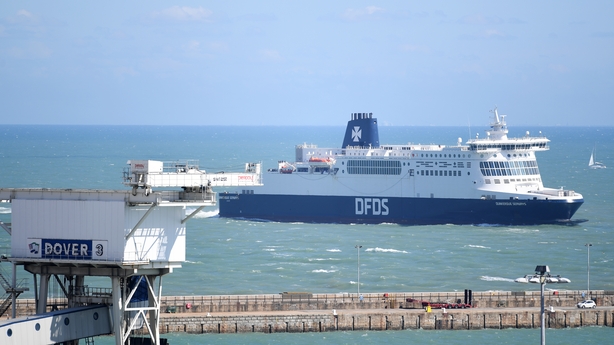French customs officials today carried out their third dress rehearsal for a no-deal Brexit in as many weeks, submitting trucks in Calais to border checks.
Exporters fear these border checks could act as a brake on cross-Channel trade.
The exercise in Calais, the busiest port in Europe for passengers and trucks crossing the Channel by ferry, is part of a month-long operation by France to showcase its preparations for a possible disorderly British exit from the EU on October 31.
France has spent some €40m and hired 600 extra customs officers to prepare for the prospect of an abrupt end to free trade between Britain and its EU neighbours.
"25 years of no border that will disappear overnight," Eric Meunier, head of the customs service for northern France told reporters.
Cross-Channel trade put to no-deal Brexit test in Calais pic.twitter.com/30tdqwEELw
— RTÉ Business (@RTEbusiness) September 25, 2019
Over the past year the French government has been scrambling to get exporters up to speed on the procedures they will need to follow to keep their British customers if trade barriers are re-established.
The deputy head of the operator of Calais port, Benoit Rochet, compared the change for companies that do business with Britain to the situation of Europeans travelling to the US, who have to apply for a visa or visa waiver ahead of travel.
"When you travel to the US you don't arrive at the airport with your hands empty," he said.
Similarly for trucks arriving in Calais "if you don't have any customs documents, don't come to the port," he warned.
The French government has assured that its new "smart border", which links the license plates of trucks heading to Britain to shipping documents filled out online by exporters, will avoid chaotic scenes of massive tailbacks on roads leading to Calais.
20 trucks - a tiny fraction of the 5,000-6,000 that travel between France and Britain each day - today were put to the Brexit test, using fake documents provided by the customs service.

Drivers arriving to board a DFDS ferry for Britain in heavy rain were asked to hand over shipping documents containing a bar code, which was scanned and forwarded along with the truck's registration number to the French and British customs service.
Not surprisingly, given that the customs service provided the test documents, no trucks were pulled out of the line because the documentation they were carrying was incomplete - a real prospect after Brexit.
Trucks arriving from Britain, meanwhile, also face possible delays, with those identified as requiring veterinary, sanitary or tariffs checks directed by new orange overhead signs towards border controls.
Around 100,000 French companies trade with Britain, which is the sixth-biggest destination for French exports.
The exercise for trucks crossing the world's busiest shipping route by ferry today comes a week after a similar test involving trucks that use the Channel Tunnel.
"I think we're ready," Jean-Michel Thillier, deputy director of the French customs service, told AFP.
"As far as customs are concerned, we have done everything we should," he said, adding there was "little chance" of major delays on the French side.
Customs officials say their main concerns are for the 25% of French companies that export to Britain who have no experience of doing business with non-EU members.
Many exporters also have yet to discover what tariffs would apply to their exports, with Britain yet to publish its full no-deal Brexit tariff schedule.
Tereos, the world's third-biggest sugar producer which supplies United Biscuits, makers of McVitie's biscuits among other British favourites, says it is bracing for import tariffs of nearly 40% on its sugar.
"We are worried about our access to the British market, import tariffs and how our clients will deal with the extra costs caused by Brexit," Paul Jacquelin, the company's business transformation manager, told AFP.

